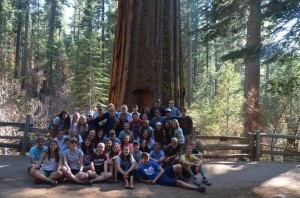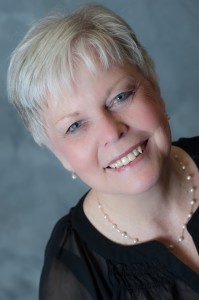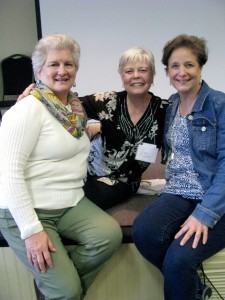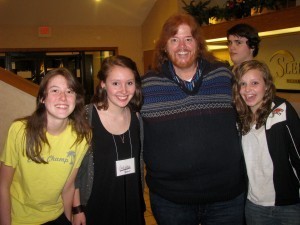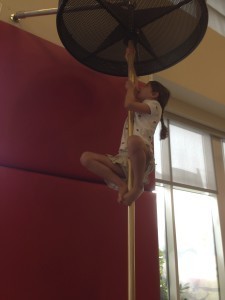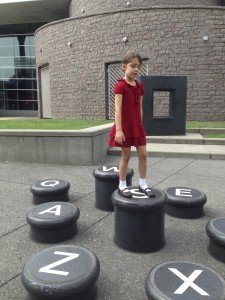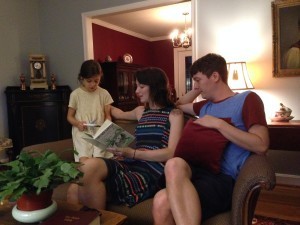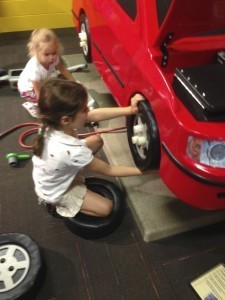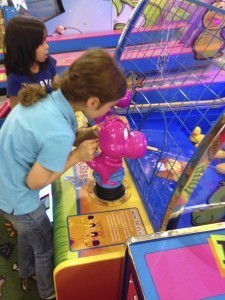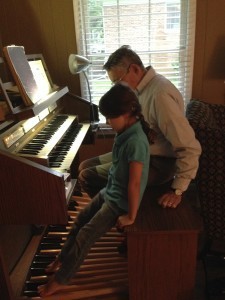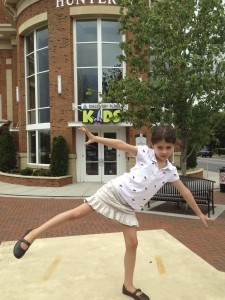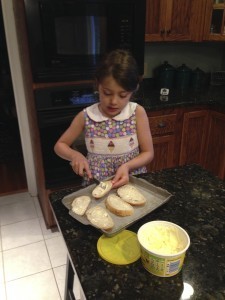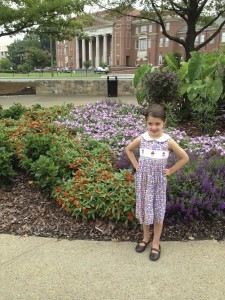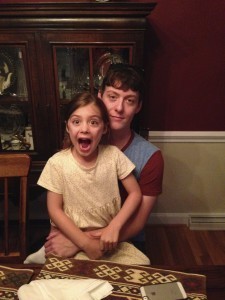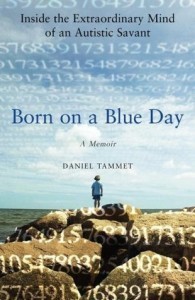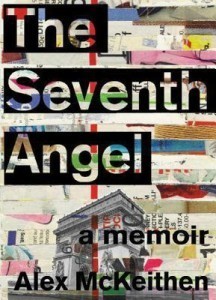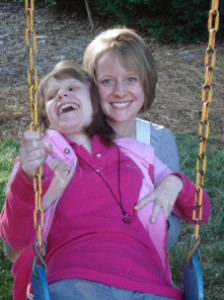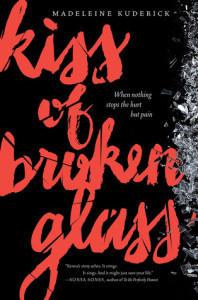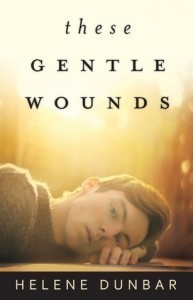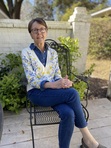Linda Vigen Phillips's Blog, page 6
August 18, 2014
My Words on EerdWord
I hope you will follow me to EERDWORD today and feel free to make comments there.
August 11, 2014
A Teen-acious Moment with Penelope Chirolde
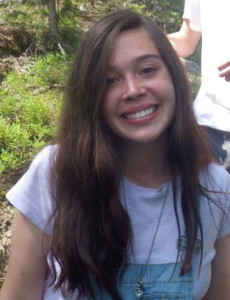 Today marks the first of monthly conversations I will be having with teens who are TEEN-ACIOUS. In a word, tenacious is determined, and if you stick around for the following interview, and all those to follow, you will see that our world is full of Young Adults who are determined to do good things. In fact, each month when I feature a teen, I will be looking for him or her to focus on one of these questions: WHATCHA READIN’, WHATCHA WRITIN’, OR WHATCHA DOIN’?
Today marks the first of monthly conversations I will be having with teens who are TEEN-ACIOUS. In a word, tenacious is determined, and if you stick around for the following interview, and all those to follow, you will see that our world is full of Young Adults who are determined to do good things. In fact, each month when I feature a teen, I will be looking for him or her to focus on one of these questions: WHATCHA READIN’, WHATCHA WRITIN’, OR WHATCHA DOIN’?
I didn’t have to ask the question of Penelope Chirolde, because she happens to be my next door neighbor for a little while longer, and all I have to do is look out my window to see that she’s been DOIN’ enough good stuff to make your head swim. I knew Penelope was in for an awesome adventure when her parents asked me to write a letter of encouragement that she would receive during a long trip sponsored by Teens Camping Tour of the West. When I looked into TCTW, I found that it had been organized some 47 years ago with the purpose of fostering leadership and spiritual development in teens on the premise that raising up spiritually strong leaders leads to a better world.
LP: Penelope, I’m so glad to welcome you as my very first Teen-acious Teen, and I’m anxious to hear all about WHATCHA BEEN DOIN’. Most immediately, I’m dying to hear all about your fabulous summer adventure.
PC: I just got back from a 23-day camping trip with TCTW (Teens Camping Tour of the West) where I slept in campgrounds with fifty-nine other teens, ages 15 to 19, from around the country as we traveled to California. Along the way we had constant talks that reminded us to love ourselves, love others, appreciate nature, realize that we were given unique gifts, and that it’s our responsibility to use those gifts to help others back home.
LP: Wow, it sounds like a wonderful trip. How did you hear about it?
PC: I originally went to a slide show with my friend, Amy Grace, to support another friend, Hilal, who had told us about it. It seemed unrealistic for me to go on the trip, but when I told my parents about it, they really wanted me to go!
LP: What were your feeling before and after the trip?
PC: I was very nervous about making friends because I tend to get shy around strangers and I was going to be surrounded by at least sixty of them! But after the trip, I realized I had a better understanding of myself and others and I definitely appreciate the great outdoors more. I didn’t really come to the trip expecting anything except having a good time, and I did.
LP: What was the most challenging part of the trip for you?
PC: Being away from home for that long was definitely the most challenging. I had never been away for more than four days before this trip and twenty-three days is a long time to be away. I also didn’t have many opportunities to speak to my parents on the trip because we weren’t allowed to bring our cell phones. I was actually glad about that, and stopped using my phone a day before the trip, so I would be ready!
LP: Have you had time to read this summer, and if so, what have you read? What is your favorite genre?
PC: Yes! On the trip we were required to read some books before day twenty. There were books available on the van, and I chose Tuesdays with Morrie by Mitch Albom. I’m also reading 1984 by George Orwell and I’m enjoying it. My favorite genre is fiction, and one of the best I’ve read (and of course I’ve seen the movie) is The Fault in our Stars by John Green.
LP: Oh, I’m with you there. I don’t usually cry at movies, but I sniffled all the way through that one! Before we leave, I want to hear about PFO, another program you are involved in during the school year. I know that on their website they say this: ”Playing for Others (PFO) provides a space for teens to explore and answer the questions, “Who Am I?” and “How will I give of that?” through programming in Personal Development, Service and the Arts.” Tell us how this translated into your own experience.
PC: The best part for me was the Buddy program, which means I mentored a nine-year-old child with cerebral palsy. We couldn’t communicate verbally, but we were able to connect in other ways. Each month all the PFO participants met together with their buddies and joined in a group activity. At the end of the school year, we produced the play Thirteen and all of our buddies came to see it. I plan to stay with this program through high school, and next year I will have a different buddy.
LP: I’m all about living a balanced life and maintaining a good mental attitude. It sounds like you are on the right track, Penelope. Any advice for your peers as you head back to school for your Junior year at Providence?
PC: Going into the school year with a positive attitude will go a long way, because dreading it isn’t going to help.
LP: I know you have a specific reason for this advice. Care to share?
PC: I knew we were moving before I went on my trip, but I didn’t think it would be this soon and I didn’t think I would have to leave Myers Park High. When my parents told me (in the car on the way home from my western trip) I freaked out, because I was really worried about losing my friends. But I know now it will be good for me to meet new people, and one of my new friends will be Justine, a foreign exchange student from France that will live with us and go with me to Providence.
LP: Penelope, thanks for telling us WHATCHA BEEN DOIN’ and best of luck at your new school. With all the things you have going on in your busy and productive life, I’m sure you will have a successful Junior year.
ATTENTION PARENTS AND TEACHERS: If you know of a TEEN-ACIOUS TEEN who is reading, writing, or doing something tenaciously, I will love to give them the spotlight on this page!!
August 4, 2014
WHAT DO YOU KNOW ABOUT WRITE2IGNITE?
Jean Matthew Hall, Director of Write 2 Ignite
I’m happy to welcome Jean Matthew Hall today to talk about writing, particularly the inception of a wonderful group called Write 2 Ignite!. Wherever you are on the writing journey–seasoned, newbie or would-be, and especially if you are a Christian writer, this is the group for you!
LP: Welcome, Jean. Tell us how Write2Ignite! was born.
JMH: In 2008 a few writers got together at the SCBWI-C Conference to chat. The group included me, Samantha Bell, Donna Earnhardt and Dr. Gail Hayes. We soon realized we were all Christians, and that we would love to see a conference for children’s writers who write from a Christian worldview – regardless of the market we write for. That chat led to lots of prayer, phone calls and planning. Out of it was born Write2Ignite!
Team members Cathy Biggerstaff, Jean Matthew Hall, and Mary Jane Downs
LP: On your website you make the following statement:
We want Write2Ignite! participants to leave our conferences with three things:
The knowledge that they heard from God about something specific in their writing and/or personal lives
New or improved skills to use in writing and/or publishing
New or strengthened connections with other writers, illustrators, teachers, librarians, agents, editors, reviewers, and/or book sellers
What part of that vision is nearest and dearest to your heart?
JMH: That’s tough for me to answer. Our vision is to educate, encourage and inspire through any avenues the Lord opens up for us. My former career was teaching. God’s overarching call on my life is being an encourager. God’s Word and the experiences of life have taught me that we cannot accomplish anything of value without the inspiration – the indwelling of the Holy Spirit. God frequently uses other Christians to do that inspiring. So, it is difficult for me to pinpoint one as nearest to my heart.
The events and sub-organizations of Write2Ignite! are not my passion. It is the effect that those things will have on Christians who communicate God’s Love and Truth, and on their audiences. From my perspective that is why Write2Ignite! exists.
LP: What would you like readers to know about the next conference on March 27-28, 2015?
JMH: We’re not giving away any secrets yet, Linda. Just kidding! We’ve just begun our serious planning and don’t have our final lineup of speakers and activities. Our plans always include workshops pointed at those who write for young children all the way through young adults – fiction, concept books, nonfiction, even magazine and devotional pieces. We’re really proud of our growing Teen Track with new leadership and lots of ideas for more fun, more learning and more friendships to come. http://w2iteens.weebly.com/.
A group of teens with scriptwriter/actor/director/speaker Torry Martin
LP: What gems of wisdom have you gained through the evolution of W2I?
JMH: I think it’s a lesson I’ve had to learn over and over in my life – that God is in control. Through many circumstances, successes, mistakes, hopes, disappointments – God is in control.
LP: Do you have time to write on your own, and if so, what are you working on right now?
JMH: Oh, my! I’m holding my side laughing like crazy. Time is my most precious commodity, I think. Write2Ignite! requires a lot from me and the other Team members. But my personal life has become very time consuming, also. So, I have to chisel out a few precious hours here and there to study, research and write. Right now my family and the work of educating, encouraging and inspiring other writers is God’s priority for me.
LP: What advice do you have for writers who are trying to break into the Christian writers’ market, and how does that compare with the secular market?
JMH: Because I’m unable to spend a lot of time writing and submitting I’m honestly out of touch, I think, and can only give you a rather generic answer to this. I think the advice is about the same for either market for those of us who entrust our writing and publication to the Lord. (1) Write and keep writing. (2) Connect with critique partners and writers’ groups. Few of us can persist in writing inside a vacuum; we need each other. A book, film or recording really is NOT the product of one person. Many people contribute to the final product. (3) Keep learning through courses, books about writing and conferences. Attend writer’s conferences and workshops that fit your need. (4) Pray. That implies speaking to God about your writing and especially listening to God about it. (5) Surrender. God has a plan – a unique plan for you and the works of art He wants you to produce. His is in control of both the Christian and general markets, I believe.
LP: Thanks for sharing your thoughts, Jean, and for being such an encourager to writers. I think we can all agree that in this lonely pursuit, we can’t have enough encouragement. I invite readers to take this opportunity to share experiences you’ve had at a Write2Ignite! conference, or to ask questions if it’s all new to you.
****************
Hey READERS, I would love to hear from you.
Is your MIND FULL of old thoughts or new?
July 28, 2014
Taking a Break from Writing (sort of)
It’s summertime, and the livin’ is easy! It’s the time when regular routines are broken by intentional fun and games. So last week, our granddaughter, Anna, came to visit and all things writerly took a break (sort of).
Imagine being ready to pop
climbing all the way to the top
thinking of words that like to rhyme
or loving books all the time;
having energy to spare
aiming for the ducks right there
knowing when to put your foot down
or raise it way up off the ground;
learning how to lay it on thick
or be a flower ready to pick.
Imagine being slightly silly enough
to say Supercalifragilisticexpialidocious….. and stuff!
I can’t imagine doing anything better than what I did last week, except maybe crafting a character from the antics of Anna someday! I love my job, and now I feel so refreshed I’m ready to get back to work!
****************
Hey READERS, I would love to hear from you.
Is your MIND FULL of old thoughts or new?
July 21, 2014
An Inside View of a Savant’s Mind
Daniel Tammet was born on a blue day, because January 31 fell on a Wednesday in 1979, and in his autistic mind, that is how he visualizes that date. Tammet is one of only fifty living savants in the world, and the only one who has been able to articulate how his extraordinary mind works.
As a child Tammet exhibited behaviors characteristic of children on the autistic spectrum, often rocking and humming, failing to use eye contact, and avoiding social interactions with adults or peers. ”I became an increasingly quiet child and spent most of my time in my room, sitting on my own in a particular spot on the floor, absorbed in the silence. Sometimes I’d press my fingers into my ears to get closer to the silence, which was never static in my mind, but a silky, trickling motion around my head like condensation.” (p. 24)
He has the same rare savant syndrome as Kim Peek, the subject of the movie Rain Main, but unlike Peek, Tammet’s condition has enabled him to live a fully independent and productive life. Having supportive parents who encouraged his acquisition of social skills was a definite asset along with his own self-motivation. As a young adult living in the UK, he volunteered to teach English in Lithuania. ”I felt very anxious about the possibility of leaving my family and traveling hundreds of miles away to a new life in a new country. But I was an adult now and knew that I had to do something if I was ever going to be able to make my own way in the world outside my room at home.” (p. 115)
Tammet had epileptic seizures as a child, and there are theories that this may have contributed to the savant syndrome. While this has not been proven, as an adult Tammet was inspired to raise money for the National Society of Epilepsy by breaking a European record of reciting over 22,000 digits of pi. A year after that feat, a major TV channel filmed a documentary of Tammet meeting and interacting with Kim Peek. Throughout his adult life Tammet has made himself available to the world’s leading neuroscientists who have studied his ability to solve complicated math problems instantly by visualizing shapes rather than making step-by-step calculations. In a similar manner he has demonstrated learning difficult languages such as Icelandic in short periods of time by absorbing their patterns.
Some readers might find Tammet’s detailed descriptions of how he manipulates numbers and words a bit tedious, but the overall effect is a fascinating glimpse into an amazing mind. His journey from an awkward, friendless childhood to adulthood where he learned how to control his obsessions, live independently, interact socially, and run a successful web-based business is a fascinating and uplifting read.
****************
Hey READERS, I would love to hear from you.
Is your MIND FULL of old thoughts or new?
July 14, 2014
Trailer and Tumblr
It’s just about a week short of three months to launch day for CRAZY and, well, things are cranking up! First, the really exciting news. This very morning Eerdmans is revealing the trailer on their website. I know, I know, some of you already saw it on Face Book because they told me I could spill the beans last Friday (lest I burst), but I’m officially featuring it here today.
I am indebted to Ahna Ziegler, who created it, and Jacob Thielman, who wrote the music especially for it–both from the very fine Eerdmans team that I have the pleasure of working with.
And, there is this on Tumblr: http://eerdblurbs.tumblr.com/post/89407540350/crazy-comes-out-this-fall
I’m going to let these visuals do the talking today, and hope that they will pique your curiosity enough to want to read the book when it comes out on Oct. 20. I’ll be posting pre and post launch events on the homepage of this website as they develop. In the meantime, you can pre-order CRAZY here.
Thanks from the bottom of my heart to all of you who are supporting me in this journey towards publication!!
****************
Hey READERS, I would love to hear from you.
Is your MIND FULL of old thoughts or new?
July 7, 2014
A Review of THE SEVENTH ANGEL by Alex McKeithen
I departed from my YA reading list last week to read a fascinating adult book that struck a chord for more than one reason. It’s called The Seventh Angel: a memoir by Alex McKeithen. It’s McKeithen’s no holds barred, very honest and frank account of his break with reality while studying painting in Tuscany during the summer of his Junior year at Davidson College.
McKeithen describes in vivid detail and authentic disconnects how he became convinced he was the seventh angel (taken from the book of Revelation 10:7) called to announce to everyone that the Apocalypse had arrived. He runs through the streets of Paris, shedding clothes at churches on the conviction that he would no longer need them. The French police arrest him at the Arc de Triomphe, totally nude, and commit him to an asylum where he is given Haldol without a definite diagnosis.
His parents arrive from Charlotte, NC and help him get released to Duke University Medical Center where he first has to experience withdrawal from the Haldol. McKeithen lands a doctor who correctly diagnoses him with bipolar disorder, puts him on lithium, and holds him at the hospital for over three months in a slow recovery process. During that time he interacts with a colorful cast of characters on the ward, and most importantly, goes through family counseling with his parents and two sisters. The classic “perfect family” is disassembled with the help of an able counselor, and by the end of their brief six-weeks of sessions, they begin to communicate and express emotions that were new to all of them.
By all accounts McKeithen’s is a success story. He returned to Paris after his recovery and graduation from Davidson and went on to get his Masters in Typography and Design in Arnhem, The Netherlands. Today he lives in New York City where he has designed for such clients as Rolling Stone and Forbes.
I told you this book struck some chords. Obviously being from Charlotte is a point of interest, but more intriguing are the similarities between McKeithen’s manic episode and my mother’s, who also suffered from bipolar. She was an artist, and during her first manic episode she was found wandering naked on the streets of Portland, Oregon on a religious quest. I’ve not read any official studies that equate art and/or religious experiences with manic episodes, but there seems to be more than one instance, the most famous of which is Vincent Van Gogh.
Finally, I was glad to see that McKeithen touched on the value of family counseling, and how each of the family members was challenged to work on his or her own issues as they related to Alex. Even though bipolar is a known chemical imbalance in the brain, the ramifications ripple through a family and affect the emotional equilibrium of the entire family and each member individually. In my mother’s day (1960’s), talk therapy was not available as it was for the McKeithens (late 1980’s), and I believe to this day that our entire family might have been healthier had that structure been in place for us.
I recommend this book to anyone who has had a loved one with bipolar disorder, or who is facing it in his or her own life. By all indications on the book jacket it seems a safe assumption that McKeithen has stayed on medication and as a result, is reaping a rich and rewarding life. I hope that is the case, because that is the strongest message anyone with this disorder to convey.
****************
Hey READERS, I would love to hear from you.
Is your MIND FULL of old thoughts or new?
June 30, 2014
Book Research and Batten Disease
On both March 24 and April 26, 2014 I wrote about Batten disease, because it figures heavily in my WIP. I’m returning to it today as the release time for CRAZY fast approaches (Oct. 20), and I become increasingly aware that the proverbial second book is not coming as quickly on the heels of the first as I would like.
Be that as it may I am plugging along, but have now hit some speed bumps filled with a number of technical questions that need answering before I can move along. I contacted my friend, Laura King Edwards, who is dedicating much of her time and energy to promoting research and writing about her sister Taylor’s battle with this horrible disease. You can learn more on her website, Taylor’s Tale, or her blog, Write the Happy Ending.
I caught up with Laura during lunch recently, where she talked about trying to juggle her own life as a young working professional, writer, wife, marathon runner and perhaps most importantly, Taylor’s number one fan and advocate. Her own writing has taken a back seat to Taylor’s most recent hospitalization, during which she underwent a procedure that represents a milestone. “It’s not a happy milestone, like losing a front tooth or outgrowing training wheels or getting a first kiss. Families fighting a life-threatening disease have ‘milestones’ they hope they’ll never reach.”
Laura beams with pride when she recounts how her “whip-smart sister taught herself to read at age three.” Life progressed at a normal clip until difficulties with math in the first grade, and the diagnosis came just prior to entering third grade at the Fletcher School, a school for children with learning difficulties. There is more than one type of Batten Disease, and symptoms progress differently for each one. In Taylor’s case, declining vision was the next hurdle. Laura remembers when the red-flag went up while attending the state fair in Raleigh, and puzzling over Taylor’s unusual groping for the stairs at night.
I asked Laura to describe the days surrounding the diagnosis, when Taylor was not quite eight and Laura was twenty-four. She talked about an almost archaic and surreal experience of mailing vials of her own blood off to Massachusetts General Hospital in Boston about six months after Taylor was diagnosed, “when I was ready to deal with it.” In about four weeks she got the results. She doesn’t have the disease nor will she get it, and when the time comes for family planning, she has a detailed report of the culprit genes and how they figure in her own genetic make-up.
She remembers feeling devastated and hopeless at first, fixated on a web site that listed the birth and death dates of children with the disease. But it didn’t take long for a healthy anger and energy to take hold in both Laura and her parents, and a belief that they could do something to beat the disease. Two months after the diagnosis ten volunteers met in a friend’s living room and several months later Laura began the blog. Not long after that, their not-for-profit organization, Taylor’s Tale, went into full swing. Since its inception in 2007, “Taylor’s Tale has raised awareness and granted more than half a million dollars to support research.”
Every family facing this terrible disease must decide how much information the child dealing with it needs to have. Batten disease is often fatal by late teens or early twenties. In Taylor’s case, Laura said, “the family has never talked to her about it and we never will.” They’ve always attempted to answer the questions about why she must take medications and why this is happening to her. As Laura put it, we tell her we are fighting the disease on her behalf.
Laura is currently working on her memoir featuring Taylor. She laughs when she says, “I never thought I would write a memoir. I majored in English and took the fiction-writing track. I’m at about 13K words and am shooting for 80K. With that said, all of my research is done, and I have an outline completed and all of my material in hand. So a lot of the hard work is behind me.” She has in mind to use one of her favorite things–running–as a metaphor, especially honing in on a special race she ran for Taylor blindfolded. You can read about it on her blog and look forward to the book that she will finish at some point down her busy road.
If you would like to join in the fight against Batten Disease, you can visit Taylor’s Tale and click on the give now tab.
****************
Hey READERS, I would love to hear from you.
Is your MIND FULL of old thoughts or new?
June 23, 2014
A Review of A Kiss of Broken Glass
Back in January I featured Madeleine Kuderick, using the who, what, where, when, why format to talk about her forthcoming YA novel, Kiss of Broken Glass (HarperTeen, Sept. 2014). Since then I have had the privilege of reading the ARC on the OneFourKidLit tour, and now I want to and need to talk about her book.
It’s breathtaking. It’s written in verse, which of course I love immediately, and it is based on the true-life story of her own daughter, which I admire and applaud even more. But that aside, it deals with a heart wrenching occurrrence—cutting— in a manner both poignant and sensitive.
The opening line caught me off-guard. The protagonist is being “Baker Acted” which in Florida means she, Kenna, has earned an involuntary psychiatric exam without her consent for cutting herself in the school bathroom. The book spans the seventy-two hours of her internment during which she observes, interacts with, and learns from a colorful cast of characters and takes the first steps toward confronting the demon head-on. Kuderick is careful to emphasize that this brief stay is not meant to cure the problem, but rather to stabilize a crisis situation and evaluate what steps might be taken towards more complete recovery.
Kuderick’s acknowledged “hundreds of hours” of researching blogs and Tumblr pages of teens struggling with cutting, along with the first-hand experience with her daughter, bring a stark reality and authenticity to her story. As a recently retired middle school teacher, I found the experimental beginnings and totally addictive progressions of students with this affliction to be both realistic and heartbreaking.
And verse lends itself so beautifully to this kind of story. Here’s Kenna, at the beginning:
I feel the calm,
the bliss,
the sheer weightlessness
of zero worry.
I’m floating on a smooth glass pond
with bottle-nosed endorphins
swimming all around,
splashing their tails,
smiling their perpetual smiles.
And here’s Kenna reconsidering:
They’re the best hands I’ve ever drawn.
And they’re not hiding inside sleeves, either,
with just the fingertips poking out,
holding the fabric tight so the cotton won’t roll up.
They’re out in the light. Palms open.
With soft, slender fingers and just enough
lines and creases to make them look real.
They’re the kind of hands an art teacher might
hold up in front of the class and while the other kids
roll their eyes or crumple up their own papers,
the teacher keeps gushing away.
I mean look at these hands, she might say.
So full of hope.
Last week I mentioned that Helene Dunbar’s recent book, These Gentle Wounds, would be an asset to any school counselor’s lesson about child abuse. Likewise, The Kiss of Broken Glass would be a powerful tool and discussion starter on this troubling occurrence in the middle and upper school population. What about you? Have you known anyone who has had a brush with this addiction?
****************
Hey READERS, I would love to hear from you.
Is your MIND FULL of old thoughts or new?
June 16, 2014
A Review of These Gentle Wounds by Helene Dunbar
************************************
It was my turn recently to receive Helene Dunbar’s recently released These Gentle Wounds making its rounds on a OneFourKidLit ARC tour and I couldn’t put it down. First of all, the cover drew me in: a winsome teenage boy resting his head on his arm in a prone position looking out somewhere past you with a lost gaze. I’ve learned on my own book journey how important covers can and should be and this one does the job admirably.
I soon learn his name is Gordie, the lone survivor of his mother’s heinous crime, in which she drove her car into the river along with him and his three siblings. The book is Gordie’s journey, with italicized flashbacks, from That Day five years earlier to his present tortured teenage life. He is left with PTSD that manifests itself in hand tremors, an in-and-out state of awareness he calls “spinning,” and almost total dependence on the protective and loving dominant-submissive relationship with his half-brother, Kevin.
Kevin’s dad took in Gordie after the incident, and Gordie seems unable to negotiate much of normal teen life without his brother’s assistance. Kevin is sixteen months older and faces his own anger issues, but the brothers share a bond that is unwavering until Sarah walks into Gordie’s life. With her own lopsided family relationships, she is able to totally understand and empathize with Gordie, and soon the romance blossoms.
As if life isn’t complicated enough, Gordie’s father reappears on the scene with a twisted motive to regain custody of Gordie. Even with Kevin’s and Sarah’s support, Gordie teeters on the brink of drowning in his own fears and the knowledge about his father that he has kept secret all these years.
No spoilers here, because this book is too good not to let you enjoy it as I did. But suffice it to say, Gordie makes an amazing discovery in the end that gives him the courage to face the demons of his dead mother and very alive father.
All the way through this riveting YA novel, my teacher self and my writer self pictured this book in the hands of school counselors who could use it powerfully in group or individual sessions about abuse. Even if that doesn’t happen, I’m sure this book will speak volumes to anyone who has had a brush with any kind of abuse.
****************
Hey READERS, I would love to hear from you.
Is your MIND FULL of old thoughts or new?



